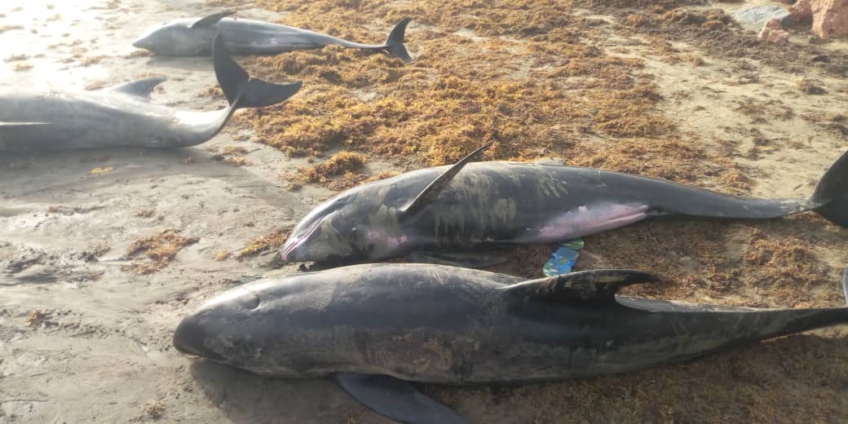Researchers at the University of Ghana have concluded that some fish that washed ashore last week was as a result of low oxygen concentration in the waters.
Preliminary investigations conducted by the Marine and Fisheries Sciences Department revealed that “most parameters required for life in the ocean were within acceptable limits, with the exception of Chemical Oxygen Demand (COD), which was significantly higher than expected.”
This comes on the back of tons of fish washed ashore in Accra which attracted many residents, some of whom picked them up either for consumption or for sale during the Easter festivities.
Similarly, some 60 dead dolphins were sighted at the shores of Axim-Bewire in the Nzema East Municipality of the Western Region.
The Fisheries and Aquaculture Minister, Mavis Hawa Koomson had revealed that fish stress is what caused the mass fish deaths that washed ashore at Osu beach per preliminary investigations by Veterinary Doctors of the Fish Health Unit of the Fisheries Commission.
Fresh information from the University of Ghana researchers corroborates this as it explains that “this oxygen demand would most likely create a condition of stress on living organisms that depend on dissolved oxygen in the water body.”
The department's press press release on April 11 says it observed a sudden drop in sea surface temperature in the coastal waters from Cote d’Ivoire to Togo a few days to the washing ashore of the fish.
Although it is not yet clear what may have triggered this development, “this is most likely an indication of upwelled water from the bottom of the ocean, probably carrying low oxygen concentration,” per the reseachers.
The statement signed by the head of department used the opportunity to appeal to government to procure a ferries geared towards monitoring marine for research purposes as global warming presents new challenges within the field.
"We depend very much on the marine living and non-living resources for a significant portion of our national wealth. It is implicit that we protect this asset through regular monitoring so as to avert any future calamity. The impact of global climate change and its vulnerability is real and coastal states are the worst to be affected," the statement added.
Latest Stories
-
Attorney General’s NSA update serves public interest – Franklin Cudjoe
15 minutes -
Postponing Fuel Levy a pragmatic move amid global oil uncertainty – IMANI boss
21 minutes -
YEA deal expired, not terminated – Zoomlion
38 minutes -
VRA cautions against farming, building within 280ft Volta Lake contour
43 minutes -
Ghana, China sign MoU to build NEV Assembly Plant
49 minutes -
Ghana Chamber of Mines engages journalists in Takoradi
53 minutes -
Fatherhood is divine – Offinso North MP
1 hour -
ALX convenes ecosystem partners to back government’s 1 Million Coders initiative
1 hour -
Horticulture is key to Ghana’s inclusive growth – Fidelity Bank MD
1 hour -
Israel–Iran War: How exposed is Ghana?
1 hour -
Ghana accelerates efforts to boost Intra-African Trade
2 hours -
Attorney General Ayine won’t trade law for pressure – Deputy AG defends integrity of prosecutions
2 hours -
Attorney General Ayine won’t prosecute without evidence – Deputy AG Srem Sai assures
3 hours -
Mahama to build Trauma and Emergency Centre in Walewale, leaves Bawumia-started project in limbo
3 hours -
Withdraw Dumsor Levy now, postponement isn’t enough – Minority Leader
3 hours

